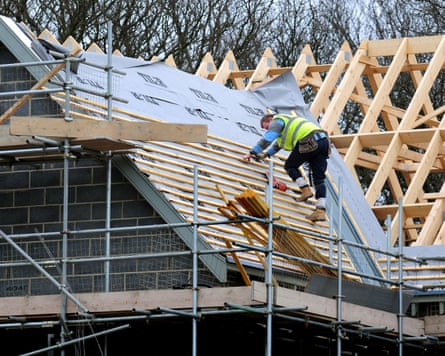PROTECT YOUR DNA WITH QUANTUM TECHNOLOGY
Orgo-Life the new way to the future Advertising by AdpathwayA scheme that enables people to get thousands of pounds off their mortgage in exchange for mucking in to build their home could provide a route to ownership for those struggling to raise a big enough deposit.
Work recently finished on an affordable housing development in Greater Manchester where buyers were given a £10,000 contribution towards their mortgage deposit.
But to get it, they had to commit to doing 500 hours of work on the site, with tasks ranging from general labour, painting and landscaping to marketing and IT support.
This type of scheme is known as “sweat equity”.
The 27-home development in Ince, Wigan, is the result of a link-up between the housing association Prima Group and the charity Housing People Building Communities (HPBC).
A disused church was converted into 13 apartments priced from £125,000, with 14 new three-bedroom homes built on adjacent land. These were priced at between £190,000 and £197,500.

Rachael McCoy, a nurse who also works at a nearby beauty salon, says the scheme “came along at the perfect time”. It meant “we could secure a safe home by working for it rather than needing to save for a deposit”.
“I’ve lived in Ince all my life, and my family are all local. We wanted to stay in the area because my daughter goes to school here, but we needed a three-bedroom home. Getting on the property ladder right now is really difficult, and the mortgage payments would have crippled us,” McCoy says.
“Being involved in building my own home was amazing. It felt like we were building a community before we even got the keys.”
Not all of the properties were sold through the equity arrangement, but where it was used, it was done on a shared-ownership basis: those taking part bought between 10% and 75% stakes in the properties, with the option to increase their stake while paying rent on the rest.
The buyers – known as “home partners” – earned £10,000 towards their deposit by contributing 500 hours to the project. That works out at £20 an hour (the national living wage for those aged 21 and over is £12.21 an hour).
Some donned hard hats, work boots and hi-vis jackets and worked on the site, while others helped with administrative tasks. Crucially, relatives and friends were able to chip in to help people hit their target – and many did.
Those behind the development are now calling for more support for the model from the government and mortgage lenders so it can become a viable alternative to the bank of mum and dad.
“We ended up with about 13 families who benefited from the sweat equity arrangement,” says John Ghader, the Prima Group chief executive.
In terms of the work people had to do, there was “quite a bit of labouring”, he says, but adds: “We didn’t force anyone to do anything they were not good at.”
Ghader suggests the model is a good alternative to parental financial help – something many people do not have the luxury of being able to access.
“Instead of putting their hands in their pocket to help with a deposit – something not every parent can afford – some have got their hands on a shovel and contributed to their offspring’s on-site sweat equity hours,” he says.
It was not all plain sailing. One couple came to the table late and were only able to complete 250 hours before all the work was done, so they earned £5,000 rather than the full amount.
One big issue was that quite a few mortgage lenders struggled to get their heads around the concept. Prima Group says some lenders “wouldn’t touch it at all”. (The names of the lenders that said no and those that agreed to lend on this basis have not been disclosed.)
“What we need now is greater understanding and flexibility from lenders about mortgage products like sweat equity so they can help more people,” says Ghader. His firm would like to see sweat equity formally recognised in mortgage applications.

This type of arrangement has been used in the UK before – for example, as part of a development in Toxteth, Liverpool, which was completed in 2019. And it has been used for decades in the US.
While the Wigan scheme has generated a lot of interest, Prima Group has no firm plans yet to repeat the exercise. It is hoping the government will pick up this ball and run with it. “It hits a number of buttons of government policy,” says Ghader. “It raises aspirations. It’s got wider societal benefits, and it can be a catalyst to regenerate neighbourhoods and raise them up.”
The scheme also offered a route to home ownership for Chloe Radcliffe, a single parent.
“My family and myself were brought up here, and my two children attend [the local] primary school.
I’ve been desperate to get on to the property ladder to provide security for my children,” says Radcliffe.
“Me, my mum, dad and sister loved working on my home and building a great little community with other people who did the same.
“Looking back at the pictures now, I think ‘Did we actually do that?’”
She adds:“Getting £10,000 off my mortgage by doing 500 hours has helped me out massively.
“Knowing you have actually worked on your house and then looking and thinking ‘It’s mine’… I can’t explain how good it feels.”


 4 hours ago
2
4 hours ago
2





















 English (US) ·
English (US) ·  French (CA) ·
French (CA) ·  French (FR) ·
French (FR) ·